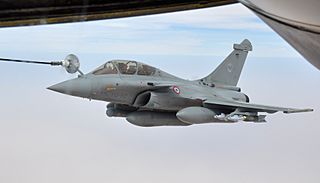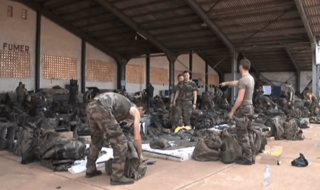Operation Serval facts for kids
Quick facts for kids Operation Serval |
|||||||
|---|---|---|---|---|---|---|---|
| Part of the Mali War and the Islamist insurgency in the Sahel | |||||||

|
|||||||
|
|||||||
| Belligerents | |||||||
|
|
|
||||||
| Commanders and leaders | |||||||
|
|
|||||||
| Strength | |||||||
|
4,000 French troops deployed (5,100 involved in total), |
Elements of:
|
||||||
| Casualties and losses | |||||||
|
|
Between 600 and 1,000 killed 50 vehicles destroyed, 150 tons of ammunitions and 200 weapons seized, 60 IEDs defused 109-300 captured |
||||||
Operation Serval (which means Operation Serval in French) was a military action by France in Mali. It started on January 11, 2013. The main goal was to remove Islamic militant groups from northern Mali. These groups had started to move into the central parts of the country.
Operation Serval began after the United Nations Security Council passed a special resolution. The government of Mali also officially asked France for military help. The operation ended on July 15, 2014. It was then replaced by Operation Barkhane, which started on August 1, 2014. This new operation continued the fight against Islamist fighters in the Sahel region. During Operation Serval, three of the main Islamic leaders were killed. Others either fled to nearby countries or were captured.
The operation was named after the serval, which is a type of wild cat found in Africa.
Contents
Why Operation Serval Started
In January 2012, a group of Tuareg people called the National Movement for the Liberation of Azawad (MNLA) started a rebellion. This happened after many weapons became available following the 2011 Libyan Civil War. The MNLA fought against Mali's central government.
By April, the MNLA announced they had achieved their goals. They stopped fighting the government and declared the independence of a region called Azawad. However, in June 2012, the MNLA started fighting with other Islamist groups. These groups, like Ansar Dine and the Movement for Oneness and Jihad in West Africa (MOJWA), began to enforce strict religious laws in Azawad.
By July 2012, MOJWA and Ansar Dine had taken control of all the major cities from the MNLA. These Islamist groups continued to expand their control over towns in Mali throughout late 2012.
Forces Involved in the Operation
French Military Forces
France sent different parts of its military to Mali. This included air, ground, and naval forces.
French Air Power
The French Air Force used various aircraft. They sent reconnaissance planes to gather information and fighter jets to attack targets. These planes were often refueled in the air by large tanker planes. Transport planes were also used to move troops and supplies.
Some of these planes were already in the region. Others flew from France to join the operation. They were based in places like N'Djamena in Chad and Bamako in Mali. Special air force units were also sent to protect French aircraft and rescue missions.
French Ground Troops
The French Army sent thousands of soldiers to Mali. They used different types of vehicles, including armored cars and infantry fighting vehicles. They also had tanks and artillery to support their operations.
These troops were organized into different brigades. Some were deployed directly from France. Others were moved from nearby countries where they were already stationed. Their main job was to fight the militants on the ground and secure cities.
The French Navy helped by using long-range reconnaissance aircraft. These planes flew from Dakar in Senegal to watch over the area. The navy also used large ships, like the Mistral-class Dixmude, to transport troops and heavy equipment from France to Africa.
Special Forces and Other Units
France also deployed its Commandement des Opérations Spéciales (COS). These are highly trained units that carry out special missions. They include army, navy, and air force special forces.
The French National Gendarmerie also sent military police. Their role was to help maintain order and provide security. Intelligence services also played a part in gathering information.
Support from Other Countries
Many other countries helped France in Operation Serval. They provided different kinds of support, but usually did not send troops into direct combat.
- Belgium: Sent transport planes and medical helicopters.
- Canada: Provided large transport planes to move French troops and supplies.
- Chad: Sent 2,000 soldiers who worked with the French command.
- Denmark: Deployed a transport plane and support staff.
- Germany: Sent transport planes and later approved sending soldiers for training, logistics, and medical support.
- Netherlands: Provided tanker planes for refueling and transport planes.
- Spain: Sent transport planes to help move African support mission personnel.
- Sweden: Allowed France to use a large transport plane and sent parachute rangers to train Malian forces.
- United Arab Emirates: Deployed transport planes to help move supplies and troops.
- United Kingdom: Sent large transport planes and surveillance aircraft. They also sent military advisers to Mali.
- United States: Set up an "air bridge" using large transport planes to move French equipment and troops. They also provided aerial refueling for French jets and used surveillance drones.
Reactions to the Operation
After France began its operation, many groups and countries reacted.
The Economic Community of West African States (ECOWAS) quickly ordered its African support mission to deploy. The European Union also sped up plans to send a military training mission to Mali.
The UN Secretary-General hoped France's actions would align with the UN resolution. Algeria, a neighboring country, supported Mali's request for help against terrorism.
The head of NATO, Anders Fogh Rasmussen, said that NATO itself would not get involved. He believed it was better for African-led forces to handle the situation.
Germany's Chancellor, Angela Merkel, said Germany could join a European training mission. However, Germany's foreign minister ruled out German forces taking part in combat.
Interestingly, the National Movement for the Liberation of Azawad (MNLA), which had started the rebellion, declared they would fight alongside France and even the Malian government to "end terrorism." They believed their knowledge of the local area would make them effective.
Many experts believed that without France's help, the government of Mali might have collapsed. France stated its reason for intervening was to prevent a "terrorist state" from forming near Europe.
The Prime Minister of Israel, Benjamin Netanyahu, praised France's action as a "brave step against extremist Islamic terrorism." However, Egypt's former President, Mohammed Morsi, criticized France's intervention.
A poll by Al Jazeera in 2013 found that 96% of Malians in the capital city of Bamako supported the French intervention.
See also
- Northern Mali conflict (2012–present)#Foreign intervention (January 2013)
- Battle of Konna
- List of battles involving France in modern history
- Operation Barkhane
 | John T. Biggers |
 | Thomas Blackshear |
 | Mark Bradford |
 | Beverly Buchanan |


